Climate resilient nursery plants Made in Hungary

According to the latest non-official statistics, in 2023 there were 335 ornamental nurseries in Hungary, covering 2500 hectares, plus 3000 ha for Christmas tree production (partly runned by Dutch firms), and provide permanent employment for about 100,000 people. Their turnover was exceeded HUF 14 Billion last year. These figures show that the situation of the Hungarian ornamental nursery sector is stable and promises significant growth in the medium term in the future.
Global climate change is creating a greater need for large areas of green space with outstanding ecological services than ever before. These plants, trees, shrubs and perennials are produced by ornamental nurseries, and are no longer luxuries but life-saving products.
Continental climate
Thanks to the continental climate of Hungary and to the temperatures between –25 and +40 degree Celsius, plants produced in Hungarian nurseries can cope excellently with the weather conditions in the countries of East- and West-Europe, from Sicily to Siberia as well. This is the main advantage of Hungarian woody nursery plants!
Besides adapting the new selections deriving from abroad, there are many internationally well-known Hungarian selections eg. Fraxinus ornus ‘Mecsek’, Prunus laurocerasus ‘Sophia’, ‘Mari’, ‘Kleopatra’, ‘Ani’, ‘Gabi’, ‘Józsa’ Tilia tomentosa ‘Szeleste’, Sequoiadendron giganteum 'Barabits Requiem’, Magnolia kobus ‘Isis’ etc.
Main market
The main market for Hungarian Nursery products are domestic landscape contractors, municipalities, wholesale markets and garden centers. The estimated share of Hungarian nursery exports is 20-30 %. The main export counties are Romania, Slovakia, Austria, and to a lesser scale to Germany, Italy, Great Britain, as well. Exporting from Hungary is more and more difficult to the Western European countries, because of market saturation. Romania, Bulgaria and neighbour countries are still a good market, but many clients there are jumping over Hungary and buying in South and Western Europe. In addition, the fallout of the “bread and butter plant”, Thuja occidentalis ‘Smaragd’ from the market due to the attack of the cypress jewel beetle (Lamprodila festiva) invaded from the Balkans in the middle on 2010’s has caused further decrease of the domestic and foreign sales as well.
The most challenging aspect and the barrier of enlarging the sale and even export is the VAT rate of 27%, what is extremely damaging for the Hungarian ornamental horticulture sector.
Association
Hungarian nurseries are gathered to the Hungarian Nurserymen Association which was established in 1990 with the participation of 45 nurseries. Its main task is to coordinate the production and make a professional corporation for business. Its’ members primary came from the western part of Hungary at the beginnings (the best terroir for openfield nursery production), but for now it possess nurseries from all over Hungary, producing not only trees and shrubs, but specialized on perennials as well. Today the Hungarian Nurserymen Association counts 200 members, among them the largest companies of the country. Its’ members are producing on approx. 1.800 hectares, which is more than 70 % of the total nursery production area of Hungary.
Multilingual catalogue can be downloaded from here: https://fakertesz.hu/storage/MDE_katalogus_2024.pdf
Hungarian Nurserymen Association organizes the prestigious exhibition HungaroGreen every year early September (next date is 2-3. September 2025.) at Flora Hungaria Ornamental Wholesale Market at Szigetszentmiklós, nearby Budapest. Participants can get an overview of the Hungarian nursery production, the high quality and wide range of woody ornamental plants, and even on Hungarian machinery inventions (eg. nursery robotics from HariBot).
The Hungarian nursery society honoured to host the Summer Meeting of the European Nurserystock Association (ENA) in Budapest this year, from 25 to 28 June 2024, with 34 delegates from more than 20 countries across Europe.